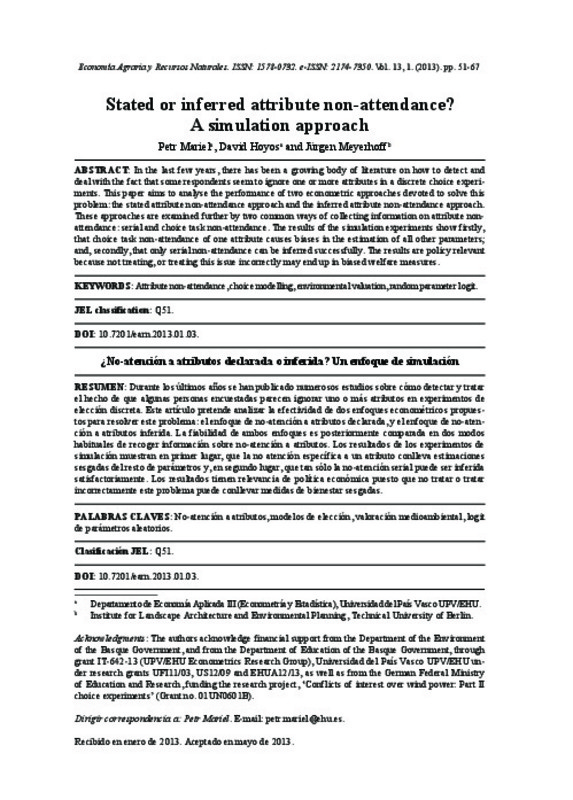JavaScript is disabled for your browser. Some features of this site may not work without it.
Buscar en RiuNet
Listar
Mi cuenta
Estadísticas
Ayuda RiuNet
Admin. UPV
Stated or inferred attribute non-attendance? A simulation approach
Mostrar el registro sencillo del ítem
Ficheros en el ítem
| dc.contributor.author | Mariel, Petr
|
es_ES |
| dc.contributor.author | Hoyos, David
|
es_ES |
| dc.contributor.author | Meyerhoff, Jürgen
|
es_ES |
| dc.date.accessioned | 2019-03-11T11:47:39Z | |
| dc.date.available | 2019-03-11T11:47:39Z | |
| dc.date.issued | 2013-06-07 | |
| dc.identifier.issn | 1578-0732 | |
| dc.identifier.uri | http://hdl.handle.net/10251/117959 | |
| dc.description.abstract | [EN] In the last few years, there has been a growing body of literature on how to detect and deal with the fact that some respondents seem to ignore one or more attributes in a discrete choice experiments. This paper aims to analyse the performance of two econometric approaches devoted to solve this problem: the stated attribute non-attendance approach and the inferred attribute non-attendance approach. These approaches are examined further by two common ways of collecting information on attribute non-attendance: serial and choice task non-attendance. The results of the simulation experiments show firstly, that choice task non-attendance of one attribute causes biases in the estimation of all other parameters; and, secondly, that only serial non-attendance can be inferred successfully. The results are policy relevant because not treating, or treating this issue incorrectly may end up in biased welfare measures. | es_ES |
| dc.description.abstract | [ES] Durante los últimos años se han publicado numerosos estudios sobre cómo detectar y tratar el hecho de que algunas personas encuestadas parecen ignorar uno o más atributos en experimentos de elección discreta. Este artículo pretende analizar la efectividad de dos enfoques econométricos propuestos para resolver este problema: el enfoque de no-atención a atributos declarada, y el enfoque de no-atención a atributos inferida. La fiabilidad de ambos enfoques es posteriormente comparada en dos modoshabituales de recoger información sobre no-atención a atributos. Los resultados de los experimentos de simulación muestran en primer lugar, que la no atención específica a un atributo conlleva estimaciones sesgadas del resto de parámetros y, en segundo lugar, que tan sólo la no-atención serial puede ser inferida satisfactoriamente. Los resultados tienen relevancia de política económica puesto que no tratar o tratar incorrectamente este problema puede conllevar medidas de bienestar sesgadas. | es_ES |
| dc.description.sponsorship | The authors acknowledge financial support from the Department of the Environment of the Basque Government, and from the Department of Education of the Basque Government, through grant IT-642-13 (UPV/EHU Econometrics Research Group), Universidad del País Vasco UPV/EHU under research grants UFI11/03, US12/09 and EHUA12/13, as well as from the German Federal Ministry of Education and Research, funding the research project, ‘Conflicts of interest over wind power: Part II choice experiments’ (Grant no. 01UN0601B). | es_ES |
| dc.language | Inglés | es_ES |
| dc.publisher | Universitat Politècnica de València | |
| dc.relation.ispartof | Economía Agraria y Recursos Naturales - Agricultural and Resource Economics | |
| dc.rights | Reserva de todos los derechos | es_ES |
| dc.subject | No-atención a atributos | es_ES |
| dc.subject | Modelos de elección | es_ES |
| dc.subject | Valoración medioambiental | es_ES |
| dc.subject | Logit de parámetros aleatorios | es_ES |
| dc.subject | Attribute non-attendance | es_ES |
| dc.subject | Choice modelling | es_ES |
| dc.subject | Environmental valuation | es_ES |
| dc.subject | Random parameter logit | es_ES |
| dc.title | Stated or inferred attribute non-attendance? A simulation approach | es_ES |
| dc.title.alternative | ¿No-atención a atributos declarada o inferida? Un enfoque de simulación | es_ES |
| dc.type | Artículo | es_ES |
| dc.date.updated | 2019-03-11T11:26:49Z | |
| dc.identifier.doi | 10.7201/earn.2013.01.03 | |
| dc.relation.projectID | info:eu-repo/grantAgreement/BMBF//01UN0601B/ | es_ES |
| dc.relation.projectID | info:eu-repo/grantAgreement/UPV%2FEHU//UFI11%2F03/ | es_ES |
| dc.relation.projectID | info:eu-repo/grantAgreement/UPV%2FEHU//US12%2F09/ | es_ES |
| dc.relation.projectID | info:eu-repo/grantAgreement/UPV%2FEHU//EHUA12%2F13/ | es_ES |
| dc.rights.accessRights | Abierto | es_ES |
| dc.description.bibliographicCitation | Mariel, P.; Hoyos, D.; Meyerhoff, J. (2013). Stated or inferred attribute non-attendance? A simulation approach. Economía Agraria y Recursos Naturales - Agricultural and Resource Economics. 13(1):51-67. https://doi.org/10.7201/earn.2013.01.03 | es_ES |
| dc.description.accrualMethod | SWORD | es_ES |
| dc.relation.publisherversion | https://doi.org/10.7201/earn.2013.01.03 | es_ES |
| dc.description.upvformatpinicio | 51 | es_ES |
| dc.description.upvformatpfin | 67 | es_ES |
| dc.type.version | info:eu-repo/semantics/publishedVersion | es_ES |
| dc.description.volume | 13 | |
| dc.description.issue | 1 | |
| dc.identifier.eissn | 2174-7350 | |
| dc.contributor.funder | Bundesministerium für Bildung und Forschung, Alemania | es_ES |
| dc.contributor.funder | Universidad del País Vasco/Euskal Herriko Unibertsitatea | es_ES |








